13 Amazing Benefits of Hiking
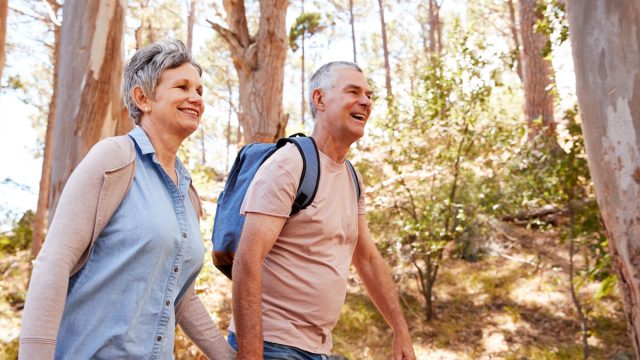
As summer gives way to fall, the cooler weather and turning leaves make for an especially invigorating and scenic hike. And while your enjoyment is all the reason you need to hit the trails, experts say there are plenty of bigger benefits to taking a stroll through nature—many of which you might not expect. Wondering what you stand to gain? Read on to learn the 13 most amazing benefits of hiking that will motivate you to get moving.
RELATED: 6 Best Walking Workouts for Weight Loss.
13 Benefits of Hiking
1. Anxiety reduction
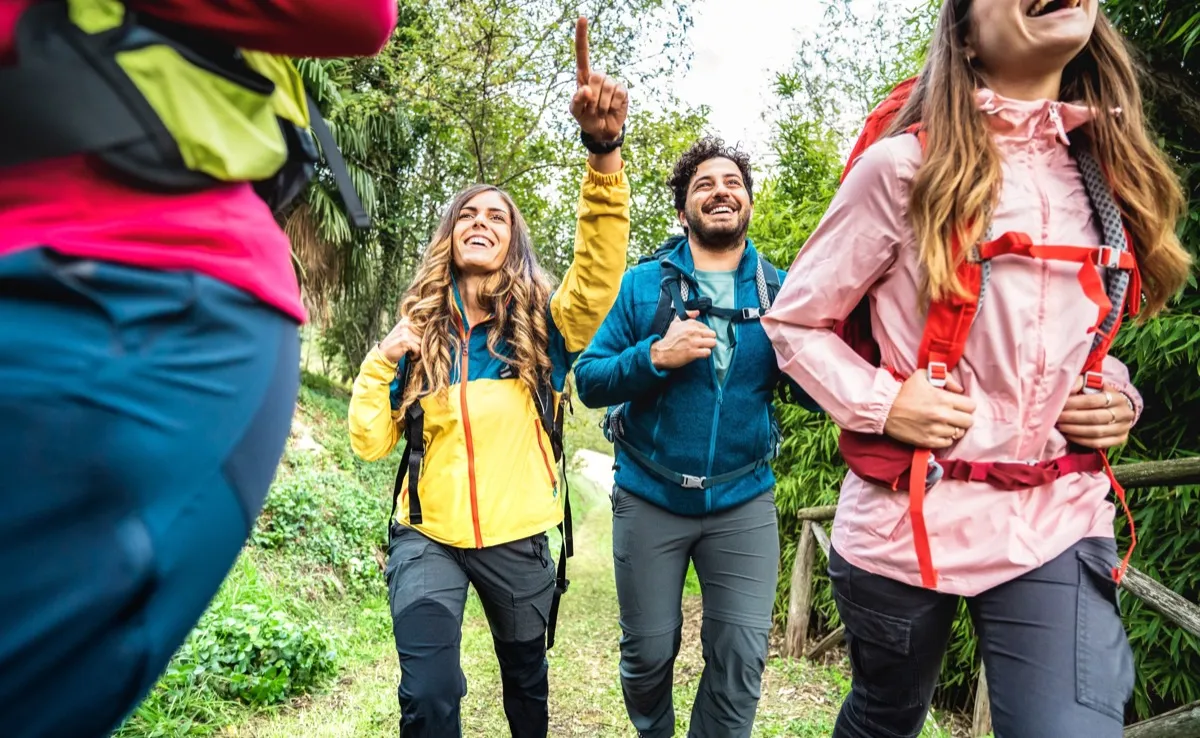
Hiking is great for your physical health and fitness, but experts say that the mental health benefits are equally impressive. In particular, taking walks outdoors has been found to be effective in helping to relieve symptoms of anxiety and depression.
“In today’s world, we spend most of our time indoors with increased screen time, which has a direct and negative impact on our mental well-being and stress,” explains Suzanne Bartlett Hackenmiller, MD, FACOG, ABOIM, a physician, author, and chief medical advisor for AllTrails. “Making the small, conscious effort to reconnect with the outside world can make all the difference in how one feels, and time in nature has been widely demonstrated to have significant benefits on both our physical and mental health; from boosting self-esteem to aiding anxiety and depression.”
2. Improved immune system
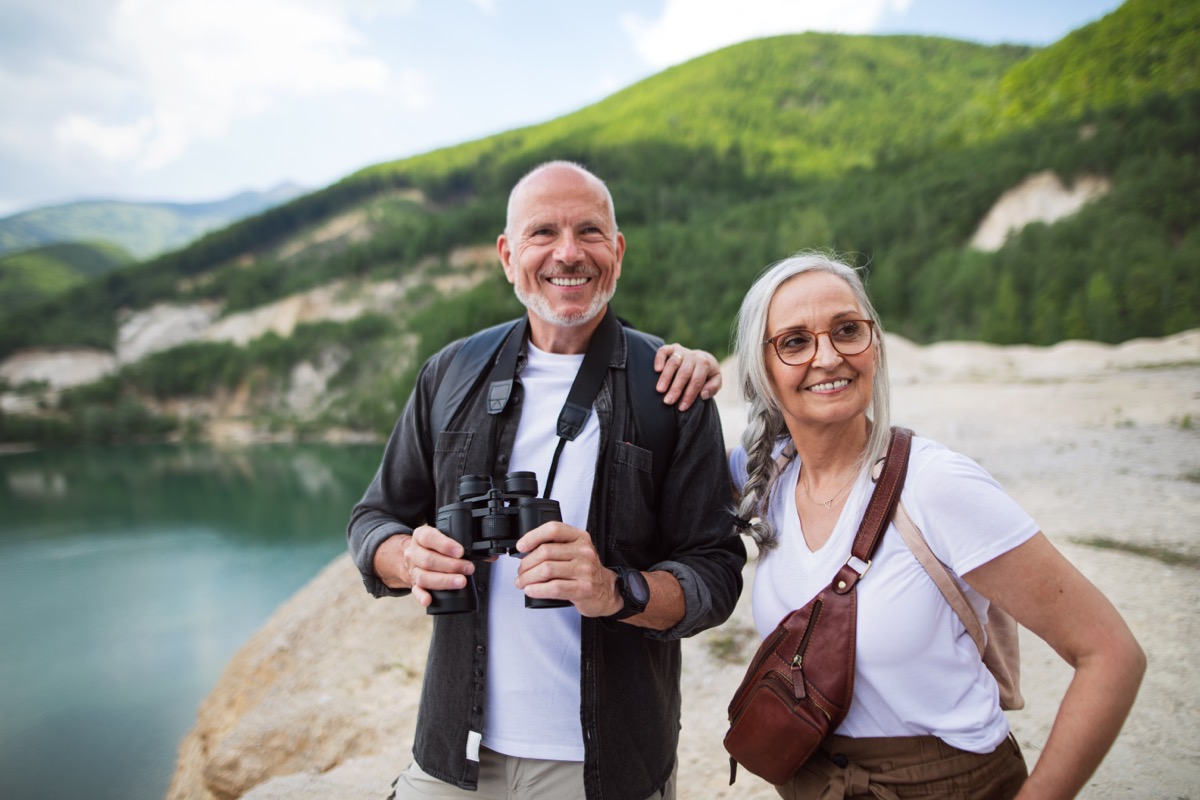
Your immune system also stands to gain from regular hikes, Hackenmiller says.
“It isn’t just stress that can be improved by investing time outdoors, you can also aid your immune system by inhaling immune-boosting phytoncides emitted by trees and plants,” she explains. “These have been found to increase our Natural Killer (NK) cell number and activity to help fight bacteria and viruses.”
RELATED: 6 Clothing Items You Shouldn’t Wear on a Hike.
3. Better core strength
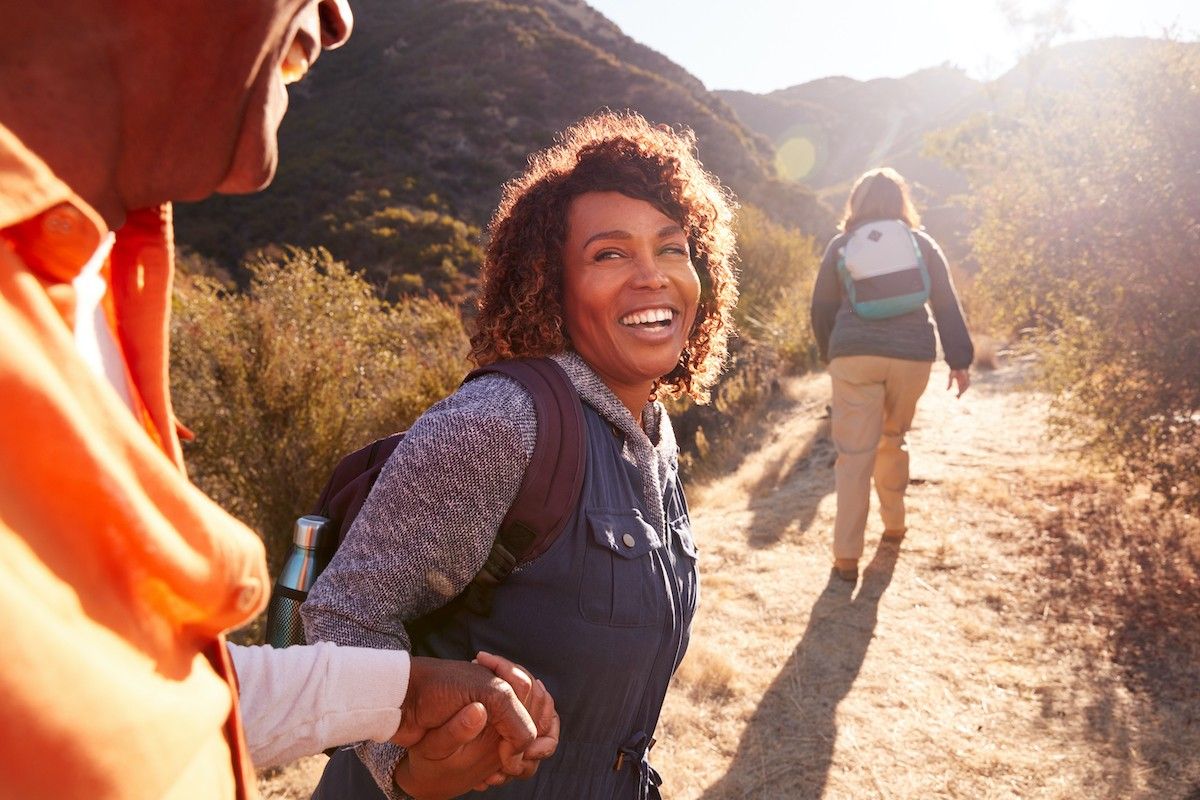
If you’re looking to build muscle and core strength, hiking will get you there faster than regular walking on the street or a treadmill, says Andrew White, a certified personal trainer and the owner of Garage Gym Pro.
“Hiking isn’t just about walking. The uneven terrains, uphill climbs, and navigating through trails gives you a full-body workout,” he explains. “This means you’re not only working on your legs but also engaging your core and strengthening smaller stabilizing muscles. Over time, you’ll find better muscle tone and an increase in endurance.”
4. Enhanced memory and cognitive health
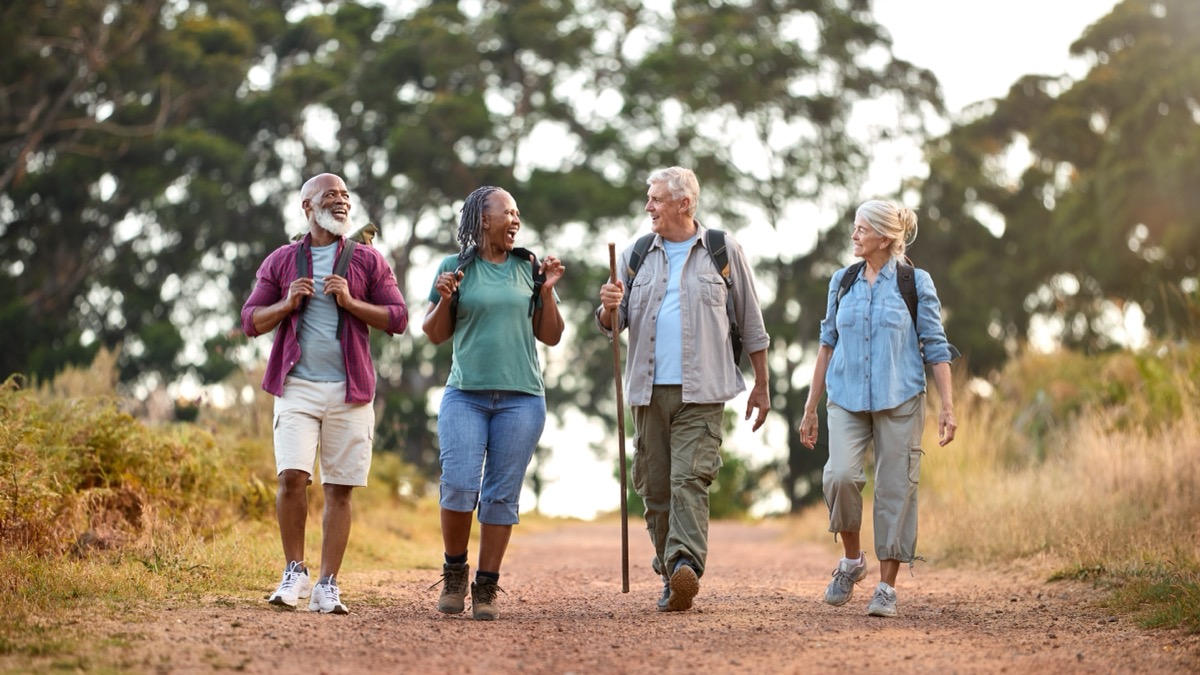
If you’re hoping to keep your mind sharp as you age, one of the best things you can do is get regular physical activity. Hiking in particular has been found to promote better memory and cognitive health, says Hackenmiller.
“Walking outdoors has been found to have many positive effects on memory and overall cognitive function. In fact, studies have found that even going for a 20-minute walk, whether that be in an urban setting or green space, can significantly benefit short-term memory as well as reducing tension, depression, anger, and fatigue,” the doctor tells Best Life.
RELATED: The 7 Best Walking Shoe Brands.
5. Improved cardiovascular health
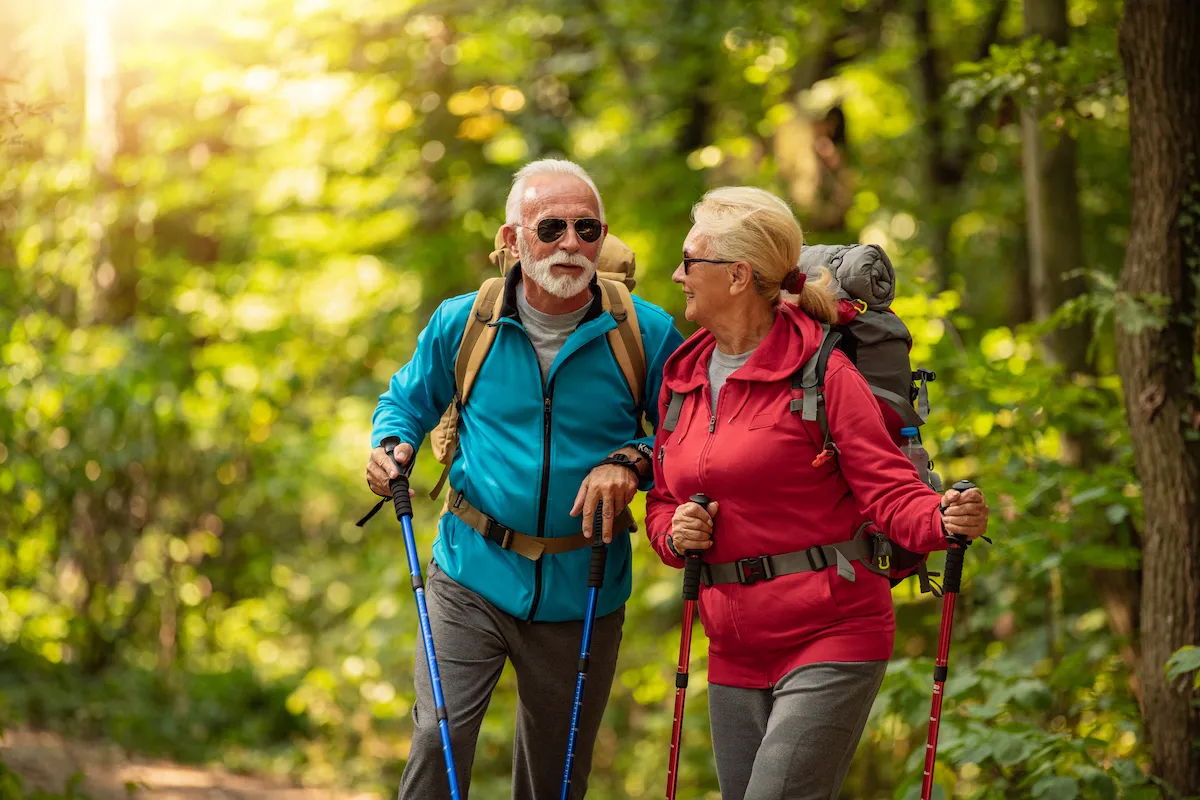
Hiking is also an excellent way to improve your heart health. In fact, a 2014 study of men with a group of heart risk factors known as metabolic syndrome found that three weeks of regular daily hiking at various levels of elevation improved their risk profile.
“Hiking involves sustained physical activity that increases your heart rate and helps improve cardiovascular health. The elevation changes and varied terrain stimulates the heart and lungs, enhancing endurance and reducing the risk of heart disease,” says Mary-Ellen Sabat, MS, RDN, LD, the nutritionist and Ace Certified Trainer behind Body Designs by Mary.
6. Weight management and weight loss
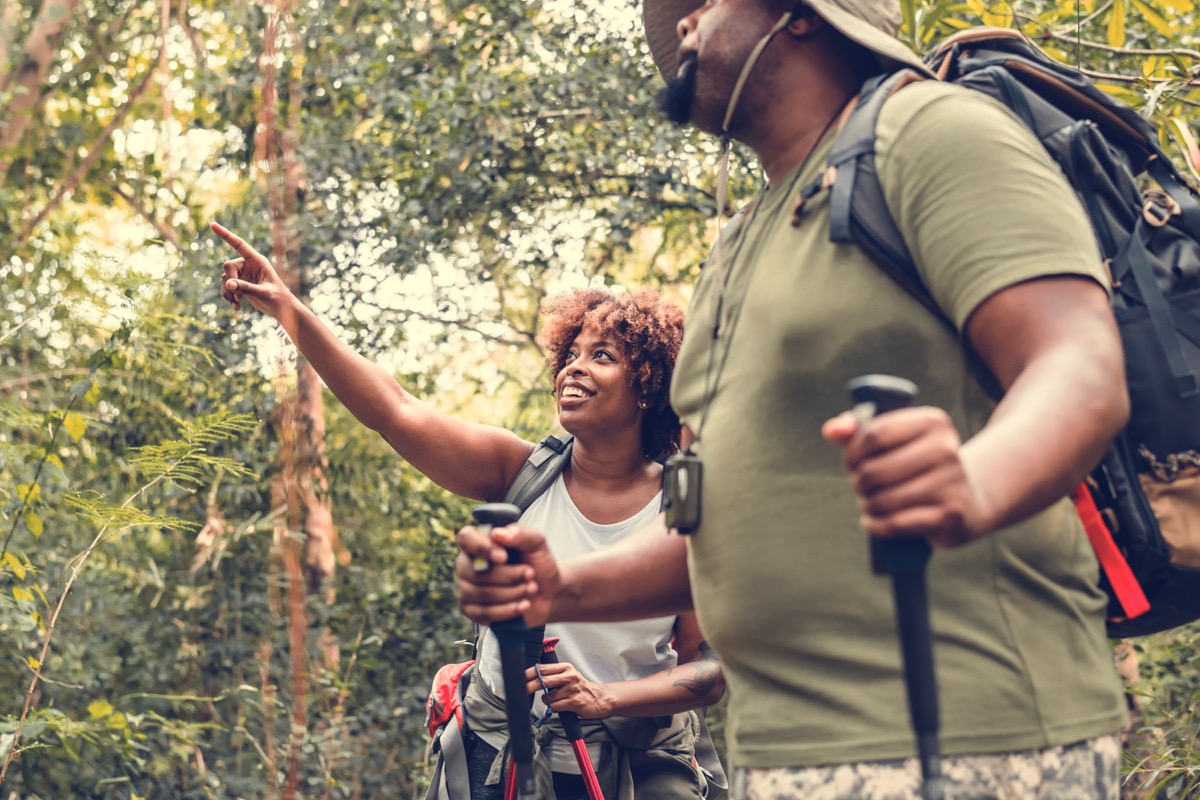
That same study noted that the subjects experienced a mean weight loss of nearly seven pounds after three weeks of daily hiking. This and other research suggests that hikes are an excellent way to maintain a healthy weight.
“Hiking burns calories at a steady rate, making it an effective way to… support weight loss goals. The longer and more challenging the hike, the more calories you can burn,” says Sabat.
RELATED: 9 Best Fitness Classes to Take If You’re Over 60, Experts Say.
7. Better sleep
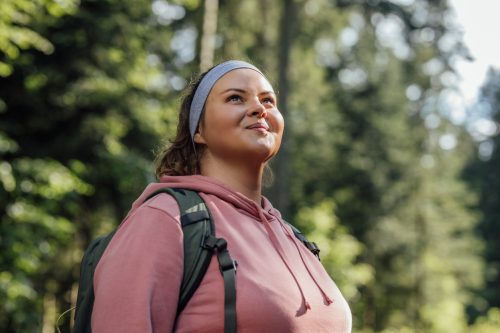
Another amazing benefit of hiking is that it can improve the duration and quality of your sleep. Hackenmiller highlights a 2020 study that found people who had greater exposure to “green space,” or areas with nature and vegetation, reported better sleep compared to people who spent more time in urban or built settings.
“On top of that, in a 2015 study, adults who took 90-minute walks in nature reported less ‘rumination,’ or dwelling on negative, stressful thoughts, than those who walked in urban settings,” the doctor notes.
8. Lower risk of seasonal affective disorder
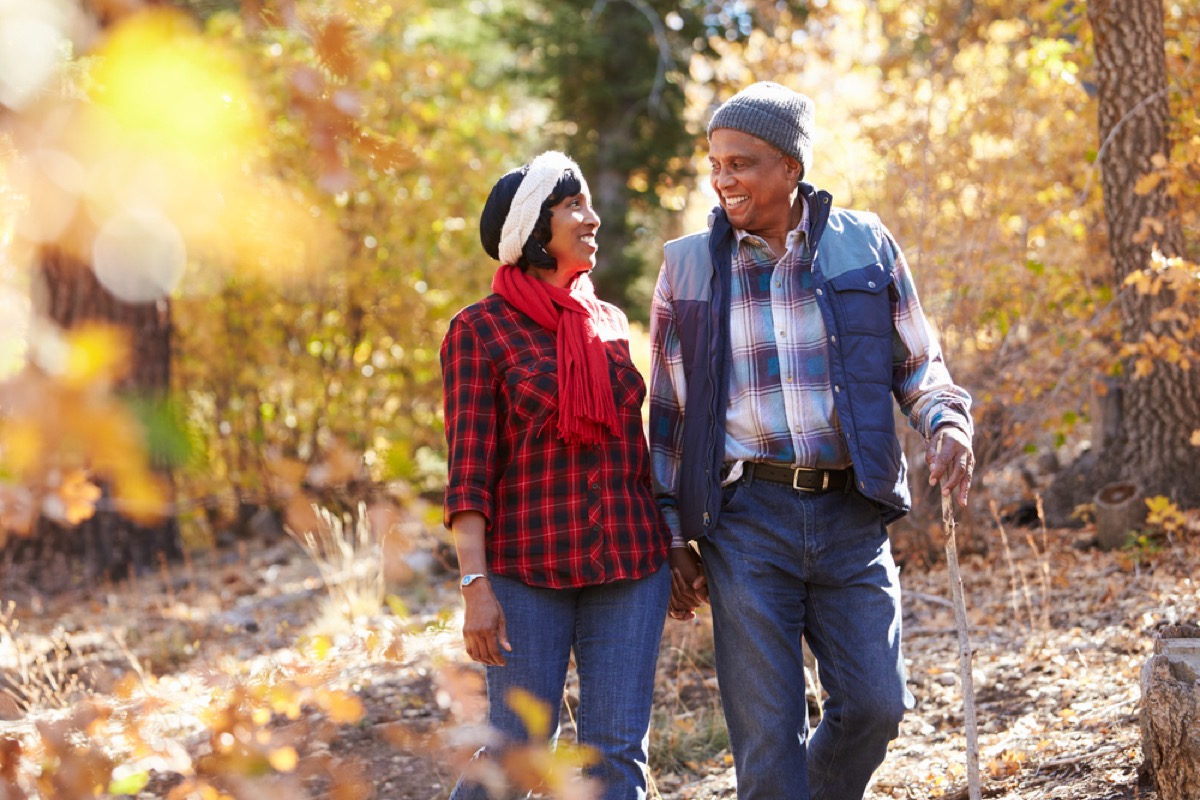
Seasonal affective disorder (SAD) is a form of depression directly related to changes in seasons that affect our exposure to daylight. Hackenmiller says that people who hike may be at lower risk for this particular mental health condition.
“A relevant study found that when patients experiencing SAD were treated with a daily one-hour morning walk outdoors, their depression score decreased 50 percent after a week of regular morning walks and natural light exposure,” she shares.
RELATED: 8 Easy Ways to Make Walking More Fun.
9. Improved balance
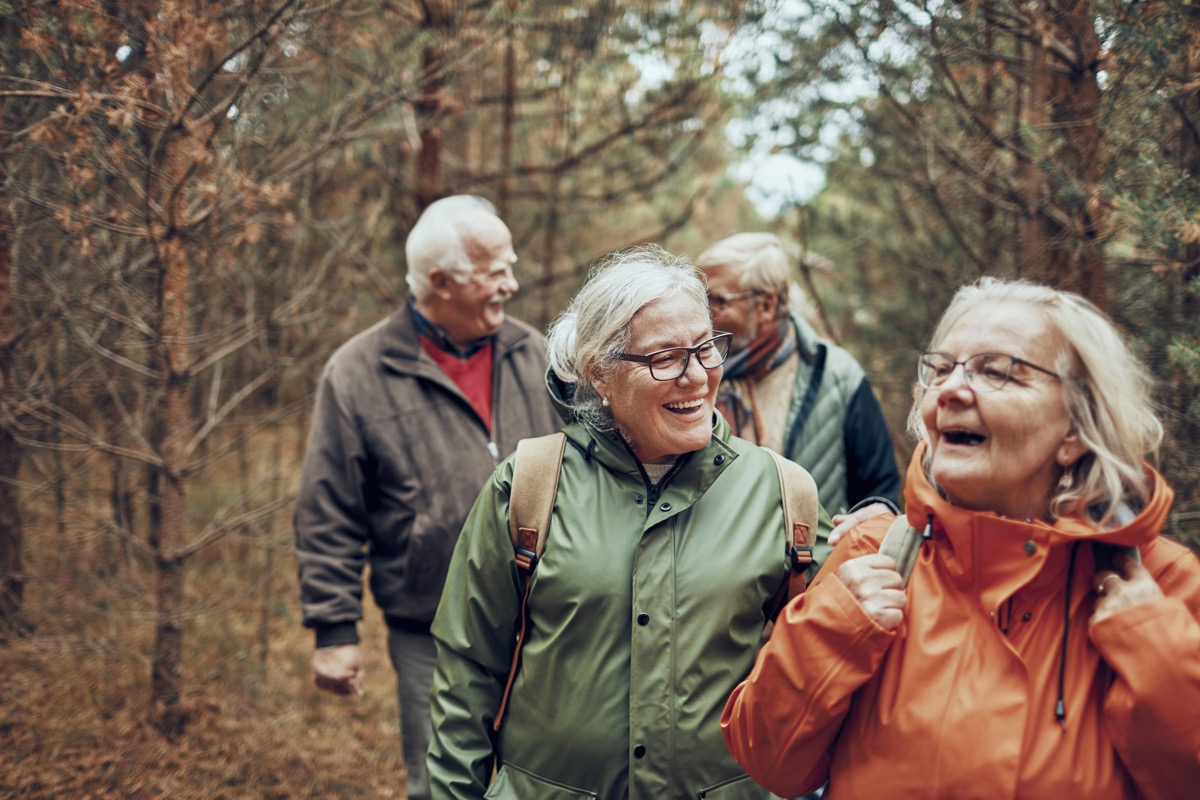
According to the Centers for Disease Control and Prevention (CDC), three million older adults are treated in emergency departments for fall injuries each year. Hiking can improve your balance, which can ultimately lead to a lower risk of fall injury as you age.
“Hiking works several muscle groups, improving strength and stability. Hiking improves your hips and core, which help you navigate uneven terrain,” explains Louise Hateley, a physiotherapist and the director of In Stride Health Clinic. “However, your equilibrium won’t be put to the same test on every single hiking track. As your hiking skills improve, attempt trails with steeper ascents and descents or more uneven terrain like roots and rocks.”
10. Increased vitamin D levels

Hiking can also provide some much-needed vitamin D by exposing your skin to direct sunlight. “Vitamin D is essential for bone health, immunity, and overall well-being,” Sabat says.
However, it’s important to note that you should always take precautions to protect your skin from sun damage and skin cancer by regularly applying a high-SPF sunscreen.
RELATED: 8 Simple Exercises That Will Make Your Joints Feel Better.
11. Better bone density
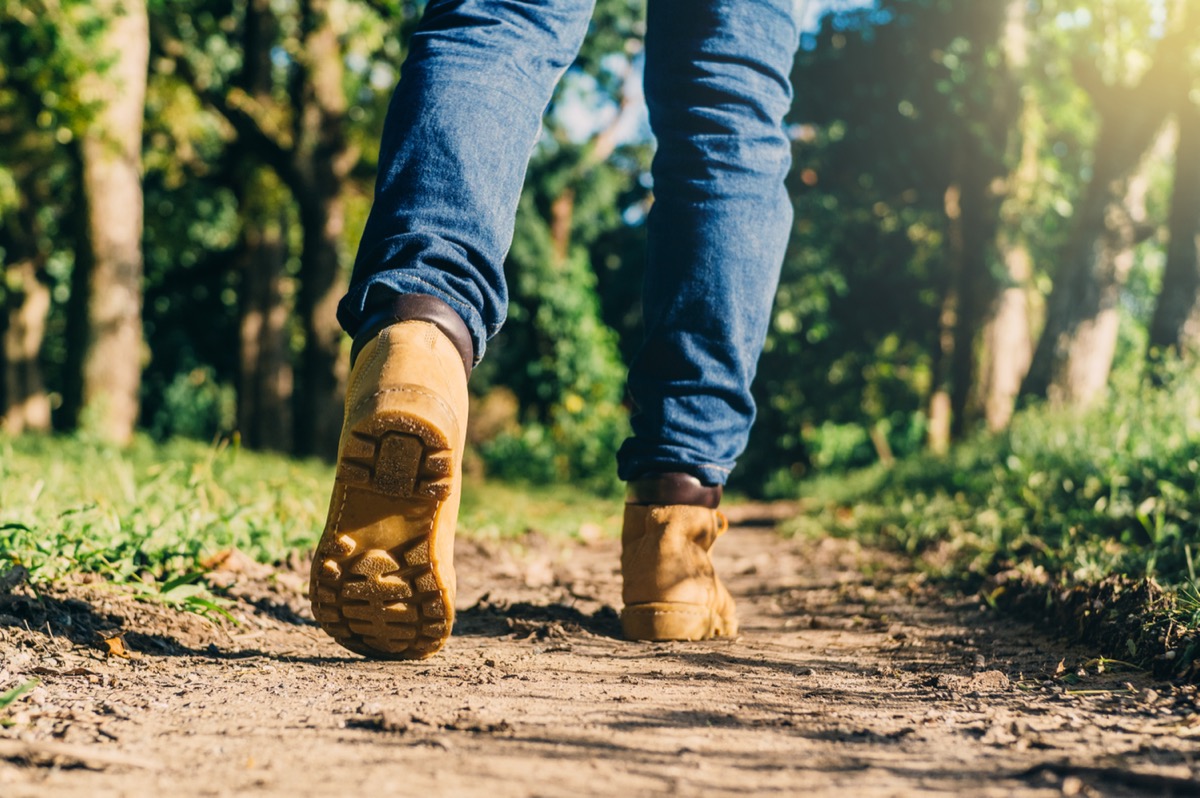
Another way that hiking can improve your bone health is by increasing your bone density. In fact, a 2022 study published in the journal Plos One found that walking volume was a key determinant in bone mineral density (BMD) in premenopausal women.
“Walking is a weight-bearing exercise, which means it helps in preventing the loss of bone density. This can be especially beneficial as we age and our bones tend to become more fragile,” says White.
12. Social connection

Hiking can be especially beneficial when you make it a group activity. “Building relationships and enjoying shared experiences in nature can reduce feelings of loneliness and improve mental health,” says Sabat.
The CDC emphasizes that the benefits of social connectedness go beyond your mental health: “Social connections are important for our survival. Our relationships with family, friends, coworkers, and community members can have a major impact on our health and well-being. When people are socially connected and have stable and supportive relationships, they are more likely to make healthy choices and to have better mental and physical health outcomes.”
RELATED: Why Walking Only 3,867 Steps a Day Is All You Need, Science Says.
13. Lower all-cause mortality

There’s one last way that hiking pays off—and it easily tops the rest. Research suggests that as you push your step count higher, your risk of all-cause mortality declines. In other words, walking may be a key to longevity.
One recent study published in the European Journal of Preventative Cardiology found particularly compelling results. Though they noted that you’ll begin seeing health benefits at just 3,867 steps, they emphasized that for every additional 1,000 steps subjects added to their daily routines, their risk of dying for any reason decreased by a shocking 15 percent.
For more wellness tips sent directly to your inbox, sign up for our daily newsletter.
- Source: https://www.scirp.org/journal/paperinformation.aspx?paperid=8364
- Source: https://pubmed.ncbi.nlm.nih.gov/24731832/
- Source: https://pubmed.ncbi.nlm.nih.gov/25703112/
- Source: https://www.ncbi.nlm.nih.gov/pmc/articles/PMC7369701/
- Source: https://www.ncbi.nlm.nih.gov/pmc/articles/PMC4507237/
- Source: https://pubmed.ncbi.nlm.nih.gov/8731073/
- Source: https://www.cdc.gov/injury/features/older-adult-falls/index.html
- Source: https://www.ncbi.nlm.nih.gov/pmc/articles/PMC8926180/
- Source: https://www.cdc.gov/emotional-wellbeing/social-connectedness/affect-health.htm
- Source: https://www.escardio.org/The-ESC/Press-Office/Press-releases/World-s-largest-study-shows-the-more-you-walk-the-lower-your-risk-of-death-even-if-you-walk-fewer-than-5-000-steps